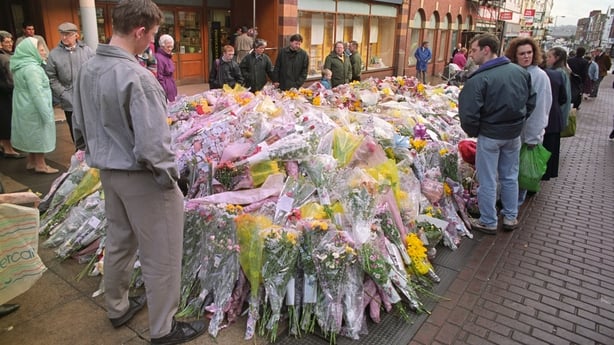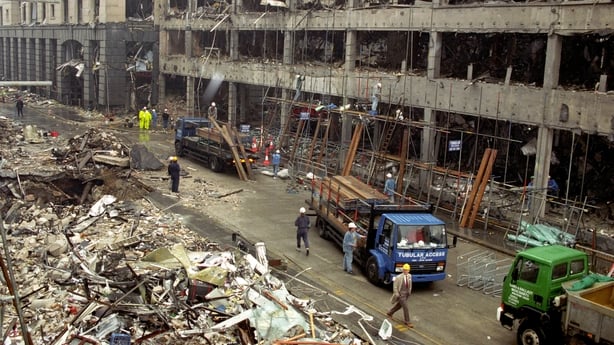By David McCullagh, Conor McMorrow and Justin McCarthy
The IRA's Warrington bomb in March 1993, which killed two children, caused a huge outpouring of emotion, whipped up anger against the Irish government, and revealed prejudice and misunderstanding about Ireland in the UK. But it left the IRA itself "emboldened" about its bombing campaign in Britain, according to newly released State Papers.
The bomb, on 20 March, 1993, claimed the lives of three-year-old Johnathan Ball and 12-year-old Tim Parry, and sparked an intense public response. The Irish Embassy in London and other Irish agencies in London received several abusive phone calls and hate letters.
According to Ambassador Joseph Small, the reaction to the bomb also revealed prejudice and misunderstanding in the UK about issues such as the Irish government's stand on articles 2 and 3, internment, extradition and "the presence of IRA 'godfathers' in our jurisdiction".
Ambassador Small's April 1993 letter to the Department of Foreign Affairs in Dublin assesses the political climate in the UK following the atrocity. Despite some incidents of anti-Irish sentiment, "the overall reaction to the Irish community was very mild… and a measure of how far things have improved compared with the 1970s when the anti-Irish backlash was very severe".
Explaining the emotional reaction to the bombing, which sparked peace marches in Ireland and the UK, Ambassador Small said: "In terms of fatalities and numbers injured, Warrington does not figure highly on the IRA's list of atrocities in Britain. Inevitably, however, the killing of the two children touched a sensitive nerve and sparked off an intense public reaction.

Reaction 'coloured by Bulger murder'
"There was an additional factor which added to this. The Warrington bombing took place within weeks of the abduction and murder in nearby Liverpool of a three-year-old, Jamie Bulger, by two young boys aged ten and eleven. This particular tragedy caused immense public outrage and led to a serious debate about the moral decline of Britain.
"Reaction to the Warrington bombing was coloured by the Bulger murder, and both events became inextricably linked in the public mind, adding to the sense of insecurity and concern here about the apparent collapse of public order and morality."
In the House of Commons on 25 March, prime minister John Major said that, while condemning terrorism, it must be borne in mind that Irish people in Ireland - North and South – and Irish citizens in the UK "condemn and detest the terrorists as much as do honourable members".
'There was also an undercurrent of criticism at what some continue to perceive as an inadequate security commitment on our part'
However, the Irish officials pointedly noted: "The prime minister's response to Paddy Ashdown is revealing, since it underlines one well known fact: when measured against the reaction to terrorist killings in Britain, deaths in Northern Ireland do not count for much. Despite the fact that they had taken place earlier that day, no reference was made to the multiple killings at Castlerock [where four Catholics were murdered by the UDA].
"This omission was reflected in the popular press. Throughout the week, for example, the tabloids had given front page coverage to Warrington, backed up by emotive editorial comment, but they carried only passing reference in news reports to the killings in Northern Ireland.
"In a week dominated by images from Warrington there was simply no room for coverage of, or editorial indignation at, the horrific killings in Northern Ireland."

'Sniping' at Articles 2 and 3
The Irish Embassy predicted that, in the short term, the Warrington bomb "will have strengthened the hand of the right-wing law and order lobby". Ambassador Small expected the Irish government to come under increased pressure to amend its Extradition Act, and also noted wider criticism:
"There was a marked increase in sniping at Articles 2 and 3, which were targeted as providing legitimacy for the IRA and their campaign, and were advanced as evidence of a certain lack of sincerity behind our expressions of condolences. There was also an undercurrent of criticism at what some continue to perceive as an inadequate security commitment on our part."
A few months later it was noted in another previously unreleased document that: "While the Warrington bomb led to enormous criticism of the Provisional IRA in Ireland and internationally, the IRA have been, if anything. emboldened by the reaction in Britain to their bombing campaign there.
"The financial consequences of the IRA bombing campaign in Britain have assumed… great significance over the last year. Two major bombs in London (the Baltic Exchange bomb in April 1992 and the Bishopsgate bomb in April of this year) led to £750m worth of damage. The IRA have made much propaganda out of these costs and have themselves claimed that their bombs caused £1.2 billion worth of damage in 1993."
Based on documents now available to view in the National Archives of Ireland.

